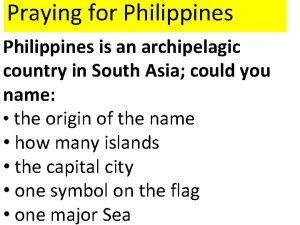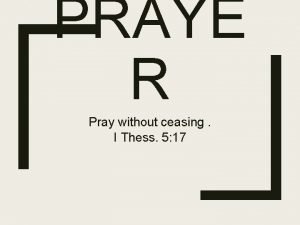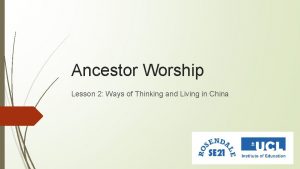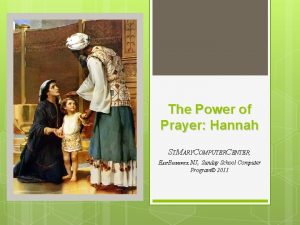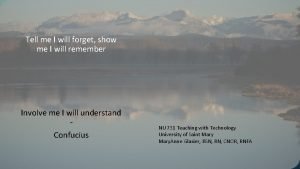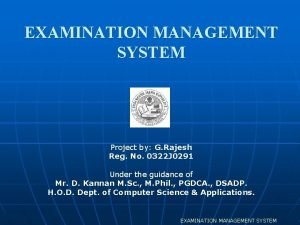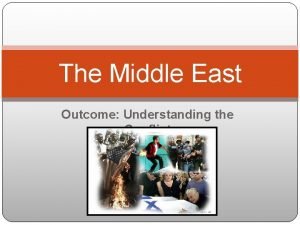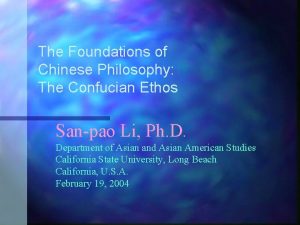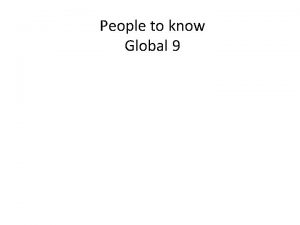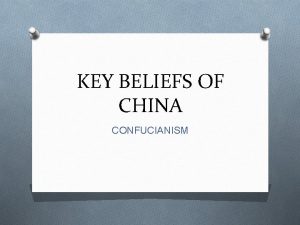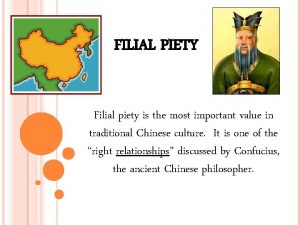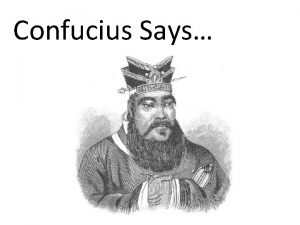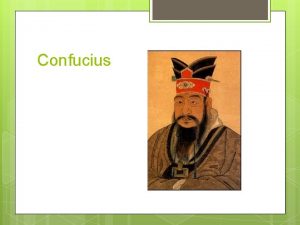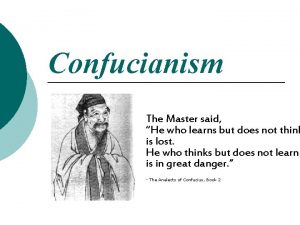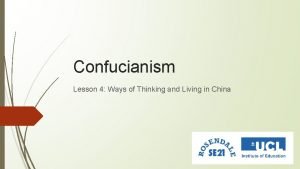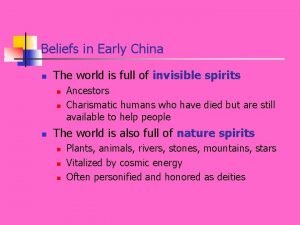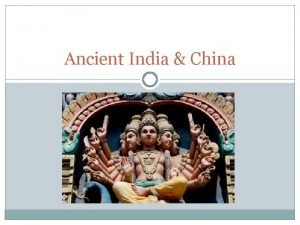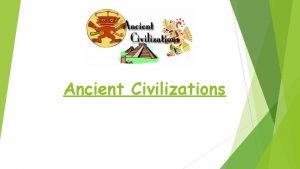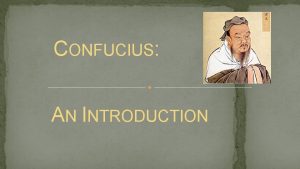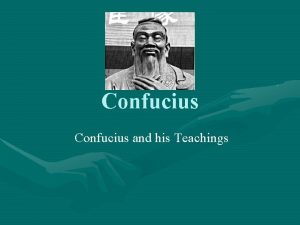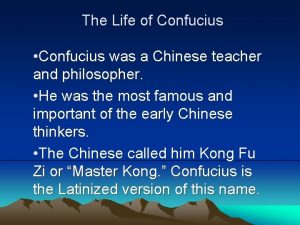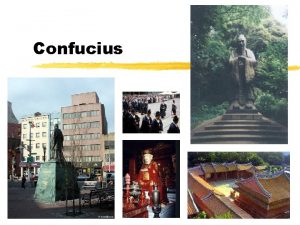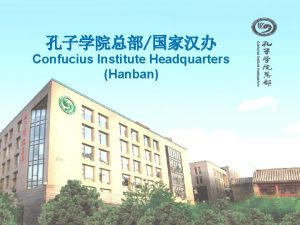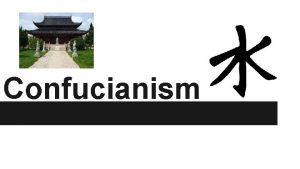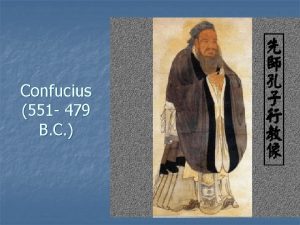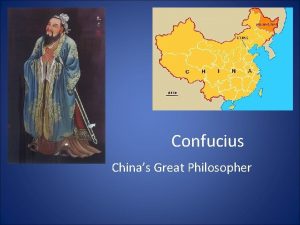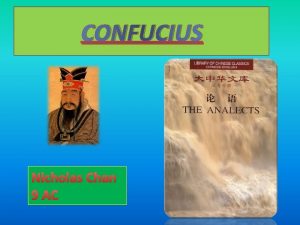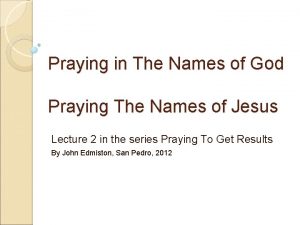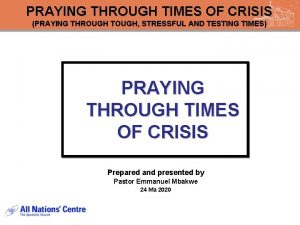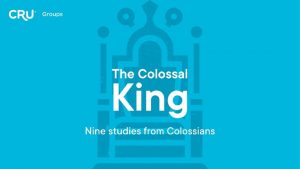National College Entrance Examination Praying to Confucius and


































- Slides: 34

National College Entrance Examination, Praying to Confucius, and Good-Fortune in China FORTY-SECOND ANNUAL CONFERENCE COLLEGE ENGLISH ASSOCIATION St. PETERSBURG, FLORIDA March 31 – April 2, 2011 Dr. Samuel Hinton Eastern Kentucky University

Abstract The purpose of this paper is to discuss connections between the National College Entrance Examination, Confucius, and Belief in Good Fortune in China. These strands are discussed using the “analysis of narrative method” (Gay, Mills, & Airasian, 2009. ) Some parents solicit the supernatural power of Confucius to help their children pass this examination. Prison authorities in a part of China have attempted to rehabilitate prisoners by having them study and take a test on the Analects of Confucius (Ames, 1999). Worship of Confucius was an important part of the imperial system of China. They treated him in those days as a deity, and many believed that he was sent by Heaven to save the world from destruction. He was considered a God with spiritual powers due to the influence of Daoism and Buddhism (Zinzhong, 2000). Adherents of a specific religion, sometimes claim spiritual superiority and exclude “others” from attaining entry to Heaven or Nirvana (Idinopulos & Wilson, 1998). Different strands in this paper may be loosely discussed within a framework of social development theory which suggests among other things, that individuals have the power to channel their hopes and aspirations for upward mobility through relevant and suitable initiatives situated in their external social world. Keywords: National College Entrance Examination, Confucius, Good-Fortune, China.

Introduction There are connecting threads between the National College Entrance Examination (NCEE), Praying to Confucius, and Belief in Good Fortune in China. The paper contains collected excerpts on interrelated strands relevant to China. These are discussed using the “analysis of narrative method (Gay, Mills, & Airasian, 2009. )”

The National College Entrance Examination It is important to pass this grueling test in order to attend a good college or university, gain social mobility, and achieve a successful career path later in life. Students dread it, and their parents stress over its outcome.

Examination

Useless Ritual? Some Chinese parents pray to Confucius to help their students pass the examinations. Do they participate in useless ritual, or do they earnestly believe that the supernatural power of the dead Sage would influence the result of the examinations?

Chinese Religion Chinese religion is generally dualistic, emphasizing the two opposed and complimentary principles of the universe: yin and yang. But the yin and yang are the double manifestation of the single, eternal cosmic principal: the Tao. Also important is the concept of heaven (T'ien), which is sometimes described in terms of an impersonal power or fate, other times as a personal deity, and can also be equated with the Tao.

Chinese Religious Beliefs Chinese religious beliefs are wide-ranging and eclectic, deriving from several religious traditions (Chinese folk religion, Confucianism, Taoism and Buddhism). But several religious concepts are characteristic of general Chinese religious thought.

Praying Hands

Prayer is a universal phenomenon. People pray for anything, and everything, every day. Prayer is anchored on faith, belief, expectations, aspirations, and thankfulness among other things. Prayer is communication with God, Saints, Angels, and/or other notable spiritual entities. It involves total surrender to an external force.

Last Resort Prayer is sometimes an activity of last resort. It offers peace, tranquility, and the satisfaction that our problems could be solved with the full force of some mighty power. Prayer is sometimes said with the help of rituals. Ritual is a ceremony performed according to instructions from a religion, culture, or group. When it is involved in prayer, ritual may be presumed to facilitate better or faster results. Ritual provides seriousness and elegance to the act of prayer.

Prayer Calms One Down Prayer calms us down when we worry or have fear. It makes us to put our trust in the hands of higher powers. Recitation of scripture such as the Confucian Analects is perceived to be helpful in rehabilitating prisoners, just like studying Christian, Moslem, or other religious scripture in prison is supposed to aid the conversion of prisoners.

Confucius Illustration by Julian Tamaki

Practices There are important ethical principles in Confucianism. However, Confucianism does not prescribe any specific rituals or practices. These are filled by the practices of Chinese religion, Taoism, Buddhism, or other religion which Confucians follow. Source: Religion Facts. Com http: //www. religionfacts. com/a-z-religion-index/confucianism. htm

Beliefs The main principle of Confucianism is ren ("humaneness" or "benevolence"), signifying excellent character in accord with li (ritual norms), zhong (loyalty to one's true nature), shu (reciprocity), and xiao (filial piety). Together these constitute de (virtue). Source: Religion Facts. Com http: //www. religionfacts. com/a-z-religion-index/confucianism. htm

Optimism Confucianism is highly optimistic about human nature. It teaches that ordinary human beings can become awe-inspiring sages and worthies (Confucius himself lived a rather ordinary life). It believes that human beings are teachable, improvable, and perfectible through personal and communal endeavor. Confucius regarded Heaven (T'ien) as a positive and personal force in the universe; he was not, as some have supposed, an agnostic or a skeptic. Religion Facts. Com

Ancient Scrolls

The Five Classics in Confucianism 1. Shu Ching (Classic of History) - collection of documents and speeches dating from the Later Han Dynasty (23 -220 CE) 2. Shih Ching (Classic of Odes) - collection of 300 poems and songs from the early Chou Dynasty (1027 -402 BC) 3. I Ching (Classic of Changes) - collection of texts on divination based on a set of 64 hexagrams that reflect the relationship between Yin and Yang in nature and society 4. Ch'un Ching (Spring and Autumn Annals) - extracts from the history of the state of Lu 722 -484, said to be compiled by Confucius 5. Li Ching (Classic of Rites) - consists of three books on the Li (Rites of Propriety) Source: Religion Facts. Com http: //www. religionfacts. com/a-z-religion-index/confucianism. htm

The Four Books 1. Lun Yu (Analects) of Confucius 2. Chung Yung (Doctrine of the Mean) 3. Ta Hsueh (Great Learning) 4. Meng Tzu (Mencius) Source: Religion Facts. Com http: //www. religionfacts. com/a-z-religionindex/confucianism. htm

Four Books

Worship of Confucius Worship related to Confucius was an important part of the imperial system. The Mongols recognized Confucianism as a Chinese religion. However, it had mixed fortunes under their rule. State sacrifices were offered to Confucius, and the study of the Classics was encouraged. They treated him as a deity, and many believed that Heaven sent him to save the world from destruction. Daoism and Buddhism influenced this attitude (Zinzhong, 2000).

Temple of Worship

Confucius and Harmonious Society “These days when we in China say that we want to build up a harmonious society, this means taking everybody’s different voices and harmoniously blending them into the voice of the greater collective. ” Yu Dan (2006. )

An Eternal Confucius I do not know if this is the Confucius of the scholars, of history, or the true Confucius. I do know that this is our Confucius, a people’s Confucius, an eternal Confucius. We need this Confucius, and we welcome him (Yi Zhongtian. (2006).

Mao-like Status A 31 - foot bronze sculpture of Confucius now sits on the east side of Tiananmen square near the portrait of Mao. The Chinese government is increasingly marshalling the popularity of Confucius to bolster national identity.

Peace and Prosperity The sculptor, Wu Weishan summarized the essential thoughts of Confucius to be love, kindness, wisdom, and generosity. He indicated that the Chinese people are striving for peace and prosperity (Chang, 2011. )

Good Fortune = Sense of well-being and happiness 1. Intend it , to attract it. 2. Work hard, to achieve it. 3. Seek out and use resources to ensure success. 4. Apply necessary strategies and processes. 5. Hope for, and anticipate positive results 6. Anticipate an alignment of external forces leading to fulfilled expectations.

Good Fortune

Cultural Alliances Major East Asian societies constitute an alliance of “Confucian” cultures that share a common heritage in the teachings of Confucius. However, early 21 st-century lifestyles in Tokyo, Seoul, Beijing, Taipei, and Hong Kong show far more evidence of globalization than Confucianization. The reputed hallmarks of Confucianism—respect for parental authority and ancestral traditions—are as salient in these cities as they are in New York, London, or Rio.

Social Development Social development theory insinuates that individuals could channel their hopes and aspirations for upward mobility through relevant initiatives, in their external social world. Chinese students study hard. In addition, their parents look to external influences such as praying to Confucius to help their children succeed.

Conclusion The National College Entrance Examination is a doorway to future career success. It is a cultural practice to pray to Confucius for good fortune and success in it. Chinese students will continue to work hard, and their parents will continue to be anxious about the success of their children.

References Becker, G. S. (1964). Human Capital. New York: Columbia University Press. Bing, Hong. (2009). The Ultimate Test of Value. Times Higher Education, July 9, Issue 1904, p 19. Bing, Hong. (2009). Success by fair means or foul. Times Higher Education, August 20, Issue 1910, p 19. Cao, Li. (2008). Parents Call on Confucius for Exam Good Fortune. China Daily, June, 5. http: //www. chinadaily. com. cn/china/200806/05/content_6737093. htm Retrieved October 18, 2010. Chang, Anita. (2011. ) China Elevates Confucius ti Near Mao-like status. SFGate. Com: Article Collections. Retrieved Online March 23, 2011. China Daily. (2010). National College Exam Begins with safety. http: //www. chinadaily. com. cn/china/201006/07/content_9945498. htm CIA The World Fact Book. (2010).

References China Under the Mongols: Confucianism. Encyclopedia Britannica. http: //www. britannica. com/EBchecked/topic/111803/China/71723/China¬underthe-Mongols? anchor=ref 590214. Dan, Yu. (2006). Confucius From The Heart: Ancient Wisdom for Today’s World. Atria Books, New York. Feng, Yuan. (1999). National College Entrance Examination: The Dynamics of Political Centrism in China’s Elites. Journal of Education, Vol. 181. Issue 1. Gay, R, Mills, Geoffrey, E, & Airasian, Peter. (2009). Educational Research: Competencies For Analysis and Applications. Pearson, Columbus, Ohio. Huntington, Samuel, P. (1993). Clash of Civilizations? Foreign Affairs, Summer. Encyclopedia Britannica: Confucianism - Demographic Influences http: //www. britannica. com/EBchecked/topic/1357503/culturalglobalization/ 225004/Demographic-influences? anchor=ref 750878 Retrieved October 10, 2010. Jacobs, Gary, and Cleveland, Harlan. (1999). Social Development Theory. International Conference on Planning and Development (ICPD). http: //www. icpd. org/development_theory/Social. Dev. Theory. htm Retrieved October 12, 2010. Liang, Lu-Hai (2010). Chinese Students Suffer As University Entrance Exams get a grip. http: //www. guardian. co. uk/. Retrieved September 3, 2010. Liu Yu, (2006). Will Confucianism help Rehabilitate Criminals? Beijing Review. Com.

References Morrison, Wayne M. (2006). China Economic Conditions. Congressional Research Service Brief for Congress Received Through CRS Web. http: //www. fas. org/sgp/crs/row/IB 98014. pdf Winzer , Margaret, A. (2006). Schooling Around the World: Debates, Challenges, and Practices. Pearson, New York. Retrieved September 12, 2009. Wing, Wah Law (2006). Education Reform for National Competitiveness in a Global Age: The Experience and Struggle of China, in Masurek, Kas and Winzer, Margaret, A. (2006). Schooling Around the World: Debates, Challenges, and Practices. Pearson, New York. Retrieved September 12, 2009. Yao, Xinzhong (2000). An Introduction to Confucianism. Cambridge University Press, Cambridge, United Kingdom. Retrieved October 15, 2010. Zhang, Yantu. (2007). Five Thousand Years of Chinese History. Foreign Languages Press, Beijing, China. © Samuel Hinton
 Seven times a day i praise you
Seven times a day i praise you The gates of time
The gates of time Prayer items for the philippines
Prayer items for the philippines What are the 5 main types of prayer
What are the 5 main types of prayer Disciple prayer
Disciple prayer Prayer for revival in our city
Prayer for revival in our city Praying for church leaders
Praying for church leaders Prayer to god before exam
Prayer to god before exam Praying for conviction
Praying for conviction Praying candle malaysia
Praying candle malaysia Mulan ancestor shrine
Mulan ancestor shrine Male vs female praying mantis
Male vs female praying mantis Hannah’s prayer
Hannah’s prayer Tell me and i will forget show me and i will remember
Tell me and i will forget show me and i will remember Examination management system
Examination management system S.e.e.i.t method driving
S.e.e.i.t method driving Entrance hidden by bricks and rubble
Entrance hidden by bricks and rubble Sequence of bullet holes in glass
Sequence of bullet holes in glass Occidental xcaret mexico
Occidental xcaret mexico Confucian values
Confucian values Timeline of confucius
Timeline of confucius Confucius beliefs
Confucius beliefs Mansa musa accomplishments
Mansa musa accomplishments Confucius institute at moscow state linguistic university
Confucius institute at moscow state linguistic university Confucianism beliefs
Confucianism beliefs Ancient china confucius
Ancient china confucius Confucius says
Confucius says How did confucianism begin
How did confucianism begin Where was confucius born
Where was confucius born Confucius values
Confucius values Confucianism
Confucianism Who was confucius
Who was confucius Confucianism belief
Confucianism belief Ancient china confucius
Ancient china confucius Ancient china confucius
Ancient china confucius


